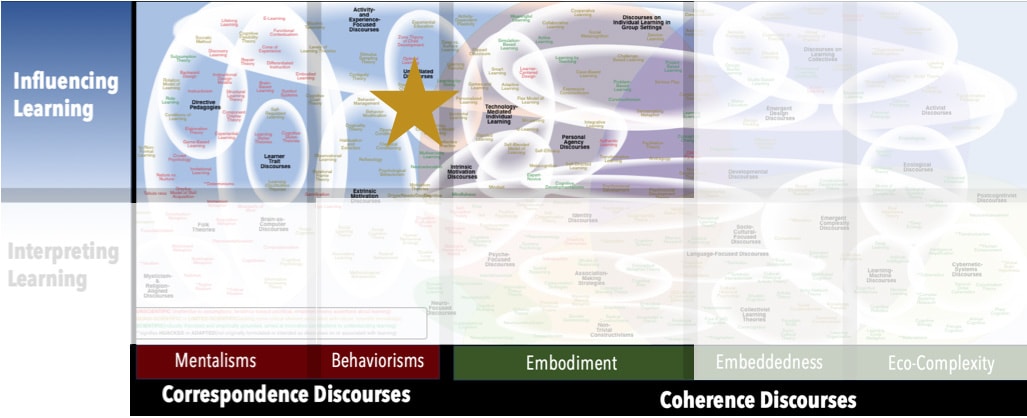AKA
Human Constructivism
Focus
Translating prominent insights on learning into principles of teachingPrincipal Metaphors
- Knowledge is … web of associations
- Knowing is … activating relevant associations
- Learner is … association maker (individual)
- Learning is … making associations
- Teaching is … formatting learning experiences
Originated
1970sSynopsis
Meaningful Learning Theory (which should not be confused with Meaningful Learning) is an attempt to translate the insights of a various current theories of learning into practical advice for teaching. That advice clusters around three main foci: Relevance (content should be meaningful – or, at least, potentially meaningful); Readiness (learners must already be familiar with concepts that can be associated with the new content); Motivation (learners must choose to relate and integrate new content). While the title “Meaningful Learning Theory” has been claimed by Joseph D. Novak, others have used the phrase “meaningful learning” to label their own perspectives, including:- Shuell Model of Learning Functions (Thomas Shuell, 1990s) – In this model, “meaningful learning” is seen to span the cognitive, metacognitive, and affective. Mashing up several other discourses, learning is characterized as active, cumulative, goal-oriented, constructive, and self-regulated.
- Taxonomy of Meaningful Learning (David H. Jonassen, 2000s) – Based on a review of research into “meaningful learning,” this taxonomy offers a hierarchy that comprises problem solving, analogical reasoning, causal reasoning, concepts-in-use, higher-order propositions, and lower-order propositions.
Commentary
The reason we have included Meaningful Learning Theory among Unaffiliated Discourses is that there are many perspectives on the meaning of “meaning” – and the original authors of Meaningful Learning Theory were not especially clear on which meanings they intended. Thus, by carefully selecting a “theory of meaning” from the list below, it’s possible to align Meaningful Learning Theory with virtually any other discourse mentioned on this site:
- Theories of meaning that align with Correspondence Discourses:
- Ideational Theory of Meaning (John Locke, 1680s) – any perspective grounded in the assumption that meaning arises from mental representations – and so words and expressions evoke mental concepts
- Referential Theory of Meaning (Denotational Theory of Meaning) (Gottlob Frege, 1890s) – any perspective grounded in the assumption that words have meaning because they refer to objects, actions, or states of affairs – that is, the meaning of a word is what it denotes
- Verification Principle (Principle of Verifiability; Verifiability Criterion of Meaning; Verificationism) (Vienna Circle, 1920s) – the assertion that a statement is deemed “meaningful” only if it can be verified through empirical demonstration or logical argument
- Theories of meaning that align with Coherence Discourses:
- Structuralist Theory of Meaning (Ferdinand de Saussure, 1890s) – any perspective grounded in the assumption that meaning is determined by differences and oppositions within a language. Affiliated categories include:
- Use Theory of Meaning (Pragmatic Theory of Meaning) (Ludwig Wittgenstein, 1920s) – any perspective grounded in the assumption that meaning is defined by how words are used in a language – that is, the meaning of a word is determined by its role in communication and social practices. Specific
- Semantic Theory of Meaning (Alfred Tarski, 1950s) – any perspective grounded in the assumption that meaning is derived from the syntactic and semantic features of language
- Truth-Conditional Theory of Meaning (Donald Davidson, 1960s)– any theory that analyzes meaning in terms of the conditions under which a statement is true – that is, knowing the meaning of a statement is understanding the circumstances that would make it true
- Embodied Theory of Meaning (Maurice Merleau-Ponty, 1950s) – any theory that asserts that meaning emerges from one’s bodily experiences in the world, especially as those experiences and their relevance are shaped by context, culture, and history
- Structuralist Theory of Meaning (Ferdinand de Saussure, 1890s) – any perspective grounded in the assumption that meaning is determined by differences and oppositions within a language. Affiliated categories include:
Authors and/or Prominent Influences
Joseph D. NovakStatus as a Theory of Learning
Meaningful Learning Theory is not – and makes no claim to be – a theory of learning.Status as a Theory of Teaching
Meaningful Learning Theory is explicitly focused on informing teaching.Status as a Scientific Theory
Meaningful Learning Theory collects and applies several principles of learning, each of which is associated with some empirical evidence – and so, in a sense, it can be described as scientifically grounded. However, with regard to our working definition of “scientific,” Meaningful Learning Theory is inattentive to its grounding metaphors (evident in its lack of a coherent and consistent vocabulary for learning). By consequence, it occupies a space that can be perceived as aligning with cutting-edge research while, at the same time, invoking notions, images, and vocabularies that simply do not fit with emergent understandings of learning.Subdiscourses:
- Embodied Theory of Meaning
- Ideational Theory of Meaning
- Referential Theory of Meaning (Denotational Theory of Meaning)
- Semantic Theory of Meaning
- Shuell Model of Learning Functions
- Structuralist Theory of Meaning
- Taxonomy of Meaningful Learning
- Truth-Conditional Theory of Meaning
- Use Theory of Meaning (Pragmatic Theory of Meaning)
- Verification Principle (Principle of Verifiability; Verifiability Criterion of Meaning; Verificationism)
Map Location

Please cite this article as:
Davis, B., & Francis, K. (2024). “Meaningful Learning Theory” in Discourses on Learning in Education. https://learningdiscourses.com.
⇦ Back to Map
⇦ Back to List
